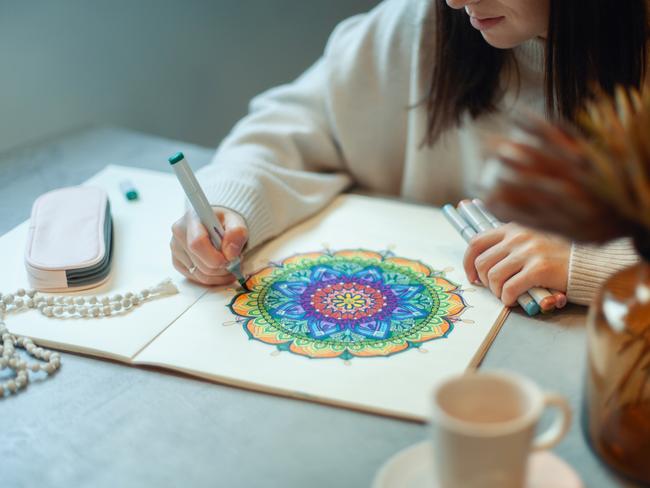The psychologist’s guide to overcoming anxiety
A mental health expert shares her techniques, from positive self-talk to facing your fears.

If anxiety is an issue, learning the skills to manage it is hugely important, says the consultant clinical psychologist Dr Beth Mosley, who has an MBE for her work in mental health education. Mosley, who is the author of the recent book Happy Families: How to Protect and Support Your Child’s Mental Health, says these techniques are worth investing in at any age. “The best predictor of success in life, and life satisfaction, is emotional health — over intellectual ability or academic attainment,” she says. Here she shares her advice for how to overcome anxiety.
How to recognise when anxiety is becoming a problem for you
Anxiety is natural and we need it to survive. It’s there to make us take action to avert a threat. It helps us to respond quickly if we step into the road and a car hoots at us. It can let us know that we’ve taken on too much and need to reassess our priorities.
A lot of anxiety is to do with the fear of messing up, of failure, of something bad happening. This becomes a problem if these fears are disproportionate or begin to interfere with how much you engage in life. This is when you become stuck in the physiological stress response that is designed to prepare you to react to potential danger. You’ll be producing adrenaline and cortisol, designed to boost energy but also make you hyper-alert. Physical effects can include palpitations, insomnia, digestive issues such as stomach ache and nausea, headaches, dizziness, tension and muscle aches. Anxiety also has an impact on your thoughts and mood. You can get stuck in cycles of negative thinking, rumination and worry, which distort your world view. This is when you need to act to combat it.
Anxiety can be common in students due to pressure to perform
Students can be in a high-pressure environment where they need to be able to perform well. It’s understandable that in such circumstances anxiety is rife because we are normally anxious about the things we care deeply about, that define our identity and purpose, and link to our sense of whether we’ll be successful in life. A common mistake is to believe that anxiety is always helpful — “It will help me revise. It will help me focus.” Even if a little exam stress may be beneficial, it becomes unhelpful if you are obsessed with the fear of failing. So you might stop doing your work because every time you look at it you feel panic and a swirl of unhelpful, negative thoughts. As the mental and physical effects of anxiety make it hard to learn, they can create a vicious cycle, bringing about the very thing you fear.
Teach yourself to reframe anxious thoughts
Whatever the circumstances in which you feel anxiety, you need to stand up to it. That means becoming aware that it’s stopping you achieving your potential. Once you tell yourself that, it may become easier to reframe it. When you feel anxious, you can tell yourself, “This is my body telling me that I’m about to do something brave,” rather than, “I’m just about to fail, therefore I need to implode, run away or escape the feelings by getting drunk.” It’s helpful to remind yourself, “This is a thought, it’s not a fact.”
Attempt to do the very thing you are anxious about
Avoid things that may offer short-term relief but will only increase anxiety in the long term. If you do the thing you are irrationally anxious about, you will learn that your catastrophising thoughts and fears were unfounded. In all probability, it will go better than you expected, or well enough. If you don’t face your anxiety, the negative beliefs grow and you won’t get to learn what you are capable of. But if you get out there you develop the skills to manage the situations you’re worried about. Even if you mess up a bit, you learn how to recover: “It was embarrassing but nowhere near as bad as I thought it would be.” You become less afraid.

Research shows that confidence is transferable — if you overcome your anxiety in one area of your life, it will help you build the confidence and skills to overcome it in other areas. That way, anxiety loses its power.
Try positive self-talk
A self-critical internal voice promotes anxiety. Self-compassion does the opposite. Positive self-talk will calm our physiological system rather than aggravate it: “This feeling will pass”; “I’m feeling this way because it’s important to me”; “I can do this.” It takes courage to do what we’re afraid of and holding on to that fact can summon a proud feeling. It’s also helpful to imagine how you’ll feel once you’ve managed to do this thing — to replace the negative imagery your anxiety has created (“I’ll have a panic attack in the exam or in this meeting”) and give you the courage to face some of your challenges. Learn to congratulate yourself on the small wins.
Seek out activities that calm you
Be conscious of the habits that make you anxious. For example, spending time on certain social media platforms or with people who elevate your anxiety rather than relieve it. When anxiety hits, move away from ruminating to problem-solving: when you respond to your body’s warning system by taking action, it is calming. So ask “what do I need to do?” or “who do I need to talk to?” Write down a plan or ask a friend for support. For example, find a friend who’s good at listening and giving objective feedback, or one who is a calming influence who can enable you to gain perspective and help you see what you need to do to resolve that problem. Seek out the activities that calm you, such as playing music, drawing, going for a run or being with your pet.
Move to physiologically rid your body of anxiety
If you’re having an adrenaline response and anxiety is coursing around your body, it’s telling you, “I need to move, I need to do something.” You can’t think clearly when anxious — everything negative is exaggerated and thus feels dire. Your brain cannot see things in a balanced way because those stress chemicals want to force you to take physical action to escape the threat. So if you do some physical activity, it has a massive impact on anxiety.

If you don’t, you’re likely to stay in that stress cycle for far longer. Break the thought cycle by going for a brisk walk or putting on some music and dancing. This will help you to process the chemicals of the stress response.
Meditation and breathing exercises will help
Activities that train your brain to be in the here and now, so that you become more aware of your thoughts and feelings without reacting to them, can be helpful. This is why practising meditation is often suggested for those looking to reduce stress and anxiety. Others prefer more vigorous activity — they might not like the feeling of hyper-awareness or focusing on their physiological symptoms. Even colouring in can be helpful (it’s a TikTok trend many teenagers are using to cope with stress).

Anxiety tends to make you worry about the past or the future, so training your brain to be more able to focus attention on the present, and on something of your choosing, can give you a sense of control over the whirling thoughts and feelings. You are regulating your own system. It’s a skill you can develop.
The Times



To join the conversation, please log in. Don't have an account? Register
Join the conversation, you are commenting as Logout